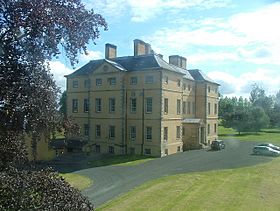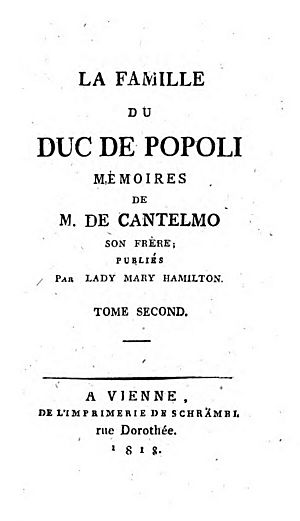Lady Mary Hamilton facts for kids
Quick facts for kids
Lady Mary Hamilton
|
|
|---|---|
| Born | 8 May 1736 Melville House, Fife, Scotland |
| Died | 28 February 1821 (aged 84) Brompton, Middlesex, England |
| Spouse(s) | Dr. James Walker George Robinson Hamilton |
| Father | Alexander Leslie, 5th Earl of Leven |
| Mother | Elizabeth Monypenny |
Lady Mary Hamilton (born Lady Mary Leslie; 8 May 1736 – 29 February 1821) was a Scottish novelist from the 1700s. She was the youngest daughter of Alexander Leslie, 5th Earl of Leven. Her son, James Walker, became a Rear admiral in the British Royal Navy.
Lady Mary's books explored ideas about philosophy, education, and art. She was very forward-thinking for her time. She strongly believed that girls and women should have access to education. Her most famous novel, Munster Village (1778), is about a perfect garden city. This city was a safe place for women who had faced difficulties or bad marriages. Some historians think that the famous author Jane Austen might have been inspired by Lady Mary's stories.
Contents
Lady Mary Hamilton: A Pioneering Writer
Early Life and Family
Lady Mary Leslie was born at Melville House, Fife, Scotland. Her birthday was 8 May 1736. She was the youngest daughter of Alexander Leslie, the fifth Earl of Leven and Melville. Her mother was Elizabeth Monypenny.
On 3 January 1762, Lady Mary married Dr. James Walker. He was a doctor in Edinburgh, Scotland. Their marriage was not a happy one. They had several children together. Lady Mary's husband, James Walker, later moved to Jamaica. He took a job there as a prison doctor.
Becoming an Author
Lady Mary started writing to support her family. She once told a friend that she had "a family of young children" and needed to "clothe, feed, and educate them." This meant she had to earn money herself. Her first novel, Letters from the Duchesse de Crui, was published in 1777.
Her children were raised with the last name Walker. Later, in 1816, they officially changed their last name to Musgrave. Lady Mary's grandson, George Musgrave, was also known as George Musgrave Walker.
Life in France and Later Years
Lady Mary later met George Robinson Hamilton. He was a relative of Alexander Hamilton, 10th Duke of Hamilton. George Hamilton owned a sugar plantation in Jamaica. Lady Mary and George settled in Lille, France, in 1782. They lived there in a grand style. Lady Mary took Hamilton's last name.
Two of her daughters from her marriage to James Walker married Frenchmen. Isabelle married the writer Victor-Joseph Étienne de Jouy. Elizabeth married General Paul Thiébaut. Lady Mary also had at least one daughter with George Hamilton, named Sophia Saint John Hamilton Alderson.
George Hamilton passed away on 29 October 1797. After his death, Lady Mary lived near Amiens, France. She became very good friends with the writer Sir Herbert Croft. He was an English scholar who wrote dictionaries. They lived together as friends. Her daughter Bell and son-in-law Jouy often visited them. Croft introduced Lady Mary to his secretary, Charles Nodier. Nodier translated her book Munster Village into French. He also helped her write another book in French, La famille du duc de Popoli (1810).
Lady Mary had many properties in Jamaica, but they did not earn much money. In 1815, she traveled to Jamaica. She believed she was not getting all the money she should from her husband's estates. These estates used to make a lot of money, but now they made much less. After she returned, she lived with her daughter Sophia Alderson. Sir Herbert Croft had passed away in 1816.
Lady Mary died in Brompton, Middlesex, near London, on 28 February 1821. Her will was settled in 1822, with her daughter Sophia and grandson Lieutenant-Colonel Leslie Walker receiving her estate. Her son, James Walker, became a Royal Navy officer and reached the rank of Rear-Admiral.
Her Amazing Books
Lady Mary Hamilton published several books:
- Letters from the Duchesse de Crui, 1777
- Memoirs of the Marchioness de Louvoi, 1777
- Munster Village, 1778
- The Life of Mrs. Justman, 1782
- The Duc de Popoli, 1810
 | Shirley Ann Jackson |
 | Garett Morgan |
 | J. Ernest Wilkins Jr. |
 | Elijah McCoy |



